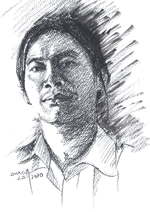Since coming into power, President Thein Sein has mentioned the importance of the fourth pillar in society and revealed that both he and his office follow media reports in and outside of Burma.
Thein Sein is known to be a bookworm who follows the news closely. Immediately after his speech in Parliament last week to mark the one-year anniversary of taking power, aides and senior officials at his office phoned several editors to ask their opinion.
During my recent trip to Burma, I was told that the president is keen to see press freedom blossom. I still have some reservations, however.
 |
Aung Zaw is founder and editor of the Irrawaddy magazine. He can be reached at [email protected].
|
What I gather is that he has also ordered the restoration of the press council in Burma. In the past, the press council was comprised of respected and powerful media moguls and editors. Re-creating this council will stir things up amongst renowned tycoons due to personal jealousy, rivalry and self-centered egotism
Indeed, how much press freedom and independent media the former general will support remains questionable—editors in Rangoon are also perplexed by the relationship between the President's Office and Ministry of Information.
There is a deep suspicion that the pair do not see eye-to-eye in developing media in Burma, let alone allowing editors to have increased authority or even the final say. Sadly, the top down approach and close control mentality is still alive.
The fact is that some governments and representatives of donor countries have been bluffed on recent media developments in Burma and the censorship board remains very active.
However, officials recently said that censorship would be abolished when the new media law is introduced this year. Exciting indeed, but this remark does not really change skeptics into enlightened believers.
Deep-seated doubts linger as many in the sector share a feeling that the government will find a way to continue controlling the media. Burma still has several draconian security laws and a notorious Electronic Act that can arrest and detain anyone, including journalists, without due process.
In terms of press freedom, Burma is still ranked 169 out of 179 countries, according to an index by Reporters Without Borders published in January.
The Ministry of Information is now drafting a media law but controversy has surfaced, as the proposed legislation has not been presented to anyone. It seemed these officials have been working away in a closet!
At a media conference—the first in many years—held in Rangoon in January, Burma's censorship chief Tint Swe, head of the Department for Press Scrutiny and Registration, said that the drafted media law “will be submitted to the Attorney General’s Office for comments, then to the cabinet for approval and then to the Pyidaungsu Hluttaw [combined Houses of Parliament] for approval.”
He added during his presentation that the new legislation will be entitled the “Printing Press and Publication Law,” with 10 chapters including “Rights, Duties and Ethical Codes for Writers and Journalists” and “Penalties.” To the astonishment of many participants, he only presented the Table of Contents of the draft but no details of the law itself.
The current censorship board will be dissolved under the new media law with a replacement “Committee for Press Freedom and Raising Ethical Standards” taking its place.
“Successful media strategies are increasingly dependent on the management of [this new media] policy,” Tint Swe told the workshop.
What is alarming is that the draft law was adapted from the repressive Printers and Publishers Registration Act enacted in Burma after the 1962 military coup. Also, no one from either the independent or private media was invited to review or discuss the proposed legislation. Moreover, there is no guarantee that it will protect press freedom or security for journalists.
Hein Latt, the editor of Popular News Journal and a central committee member of the Myanmar Writers and Journalists Association, told The Irrawaddy after attending the media conference: “I think the media law here will be more like in Singapore, Malaysia and Vietnam. If so, press freedom would not change much although it may relax somewhat. We cannot expect much.

